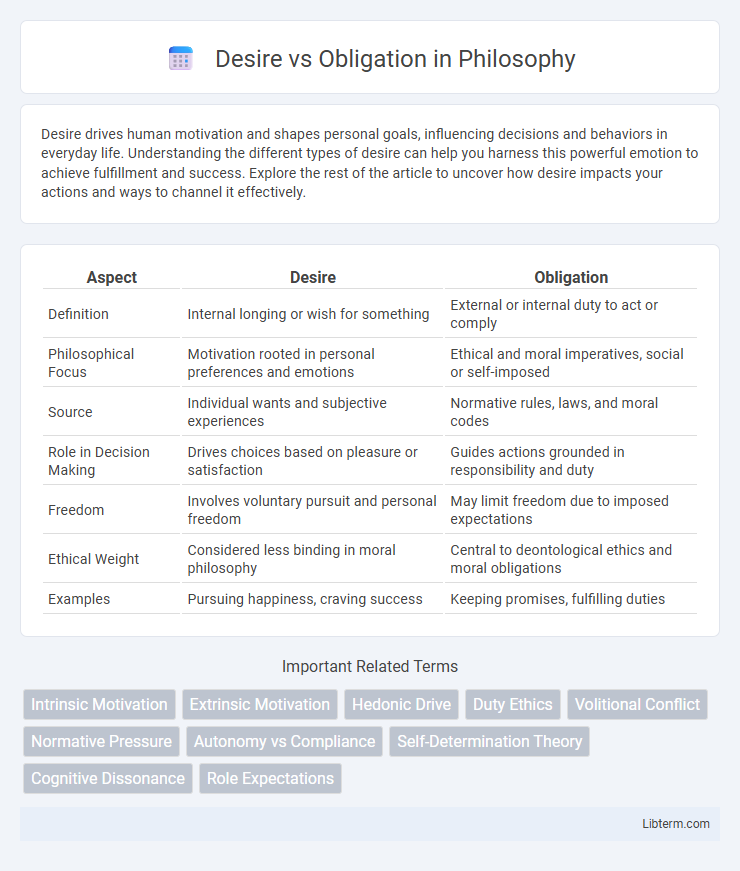Desire drives human motivation and shapes personal goals, influencing decisions and behaviors in everyday life. Understanding the different types of desire can help you harness this powerful emotion to achieve fulfillment and success. Explore the rest of the article to uncover how desire impacts your actions and ways to channel it effectively.
Table of Comparison
| Aspect | Desire | Obligation |
|---|---|---|
| Definition | Internal longing or wish for something | External or internal duty to act or comply |
| Philosophical Focus | Motivation rooted in personal preferences and emotions | Ethical and moral imperatives, social or self-imposed |
| Source | Individual wants and subjective experiences | Normative rules, laws, and moral codes |
| Role in Decision Making | Drives choices based on pleasure or satisfaction | Guides actions grounded in responsibility and duty |
| Freedom | Involves voluntary pursuit and personal freedom | May limit freedom due to imposed expectations |
| Ethical Weight | Considered less binding in moral philosophy | Central to deontological ethics and moral obligations |
| Examples | Pursuing happiness, craving success | Keeping promises, fulfilling duties |
Understanding the Essence of Desire
Desire represents a powerful intrinsic motivation shaped by personal aspirations, emotions, and values, contrasting with obligation, which is driven by external duties, rules, or expectations. Understanding the essence of desire involves recognizing its role as a fundamental catalyst for creativity, goal-setting, and fulfillment in human behavior. Neuroscientific studies reveal that desire activates the brain's reward system, emphasizing its influence on decision-making and personal growth dynamics.
Defining Obligation in Modern Life
Obligation in modern life refers to the binding responsibilities and duties individuals must fulfill, often shaped by social, professional, and legal frameworks. These commitments can include work deadlines, familial roles, and societal expectations that demand consistent adherence regardless of personal desires. Understanding obligation involves recognizing the balance between external demands and internal motivations that influence behavior and decision-making.
Psychological Foundations: What Drives Us?
Desire and obligation originate from distinct psychological foundations influencing human motivation and behavior. Desire is driven by intrinsic motivation, linked to personal goals, emotions, and rewards, activating brain regions such as the ventral striatum associated with pleasure and motivation. Obligation stems from extrinsic motivation, shaped by social norms, duties, and expectations, engaging the prefrontal cortex involved in self-control and ethical decision-making.
Desire vs Obligation in Personal Relationships
Desire in personal relationships fuels intimacy, connection, and mutual happiness by aligning partners' interests and emotional needs, while obligation often stems from societal expectations or perceived duties, which can create tension or resentment if unmet desires are suppressed. Balancing desire and obligation requires open communication to ensure that responsibilities do not overshadow genuine affection and individual fulfillment. Prioritizing shared goals and emotional authenticity enhances relationship satisfaction, moving beyond mere obligation to a deeper, desire-driven partnership.
Career Choices: Passion or Responsibility?
Career choices often balance the desire for passion-driven work with the obligation to secure financial stability and fulfill familial expectations. Pursuing passion can lead to higher job satisfaction and long-term motivation, while prioritizing responsibility ensures consistent income and career progression. Research shows that integrating personal interests with practical demands enhances overall career fulfillment and reduces burnout.
The Role of Culture in Shaping Desire and Duty
Cultural norms deeply influence the balance between desire and obligation, shaping individual motivations and social responsibilities. In collectivist cultures, duty often takes precedence over personal desire, reinforcing community harmony and social roles. Conversely, individualistic cultures prioritize personal desires, encouraging self-expression and autonomy within societal frameworks.
Navigating Conflict: Balancing Want and Must
Navigating the conflict between desire and obligation involves recognizing personal wants while honoring essential responsibilities. Effective balance requires prioritizing tasks based on long-term goals and immediate needs, ensuring neither intrinsic motivation nor external duties are neglected. Techniques such as time management, boundary setting, and reflective decision-making support harmonizing internal drives with obligatory commitments.
Impact on Mental Health: Fulfillment vs Stress
Desire-driven actions promote mental well-being by fostering fulfillment, intrinsic motivation, and positive emotions, enhancing overall life satisfaction. Obligation-based tasks often trigger stress, anxiety, and feelings of burden, potentially leading to burnout and decreased mental health over time. Balancing personal desires with necessary obligations is crucial for maintaining psychological resilience and emotional balance.
Strategies for Harmonizing Desire with Obligation
Balancing desire with obligation requires setting clear priorities to ensure personal goals align with responsibilities, fostering motivation rather than conflict. Time management techniques such as time-blocking enable dedicated periods for passion projects alongside mandatory tasks, reducing feelings of overwhelm. Incorporating self-reflection practices helps identify when obligations can be renegotiated or delegated, creating space to pursue desires without compromising commitments.
The Future of Decision-Making: Toward Authentic Living
The future of decision-making emphasizes balancing desire and obligation to foster authentic living, where personal values guide choices over societal pressures. Neuroscientific research highlights how integrated emotional and rational processing leads to more genuine, satisfying decisions. Emerging technologies like AI-driven analytics support individuals in aligning decisions with long-term aspirations, reshaping autonomy in daily life.
Desire Infographic

 libterm.com
libterm.com